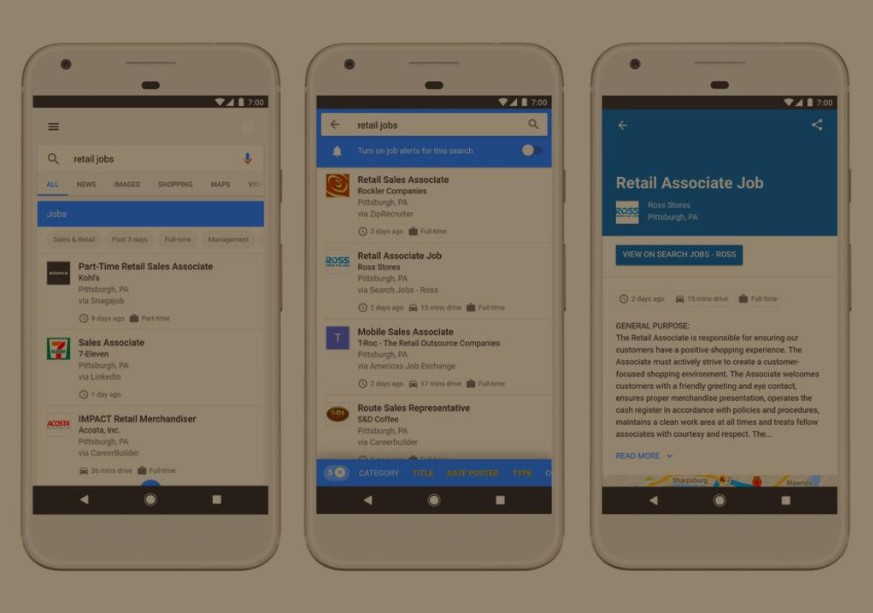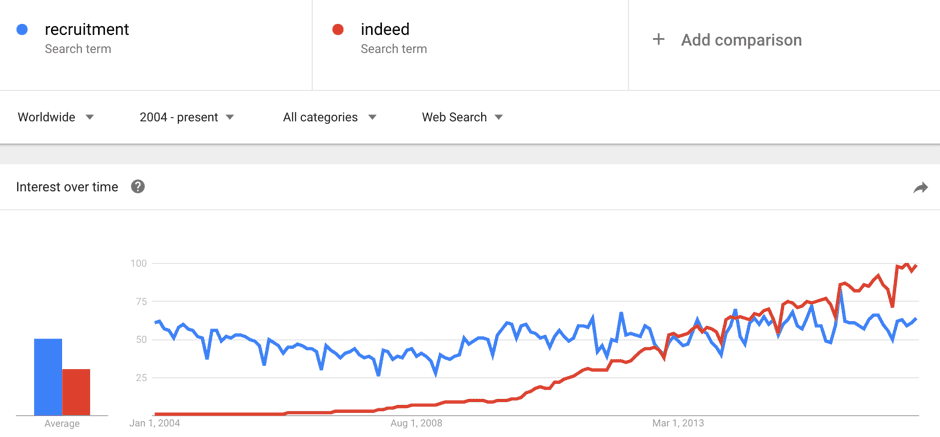
Explore our NEW Knowledge Base and Help Desk to find everything you need to attract, engage and convert talent with your Vennture website.
Discover More
At Google’s annual I/O conference the search giant announced that it will be launching Google for Jobs, an initiative aimed to ease the friction job seekers currently have as they scour the web for their next role.
By harnessing machine learning, Google for Jobs will enhance the user experience of job seekers by providing them with more relevant results, estimations of commute time and better filtering functionality—all without leaving the search engine.
However, as Dan Shure demonstrated, three weeks before I/O happened, Google have already had this in live user testing.
The most startling part about this is that it has taken so long for Google to enter the $200b industry. Venn suggested that this could happen two years ago when covering the dominance we had seen from Indeed within the job search industry. Bill Slawski was quoted as saying –
“Google’s Head of Structured Data, Alon Halevy, “developed a site that aggregated classifieds information together, much like Indeed does””. [before he worked for Google].
But Google aren’t the only ones trying to get a stranglehold on the industry, Facebook have joined the party, meaning that the most popular social network in the world, as well as the biggest search engine in the world are now helping users find jobs. In addition to this there is also LinkedIn as well as the aforementioned Indeed, plus other popular job board websites like Glassdoor and Monster.
Google favours data it can pull en masse, i.e. when it is in a structured format that can easily be crawled. We have seen for some time that Google uses schema in the SERPs and job schema has been used as part of this for several years, as the below example shows.

Indeed and other job search websites, such as Monster and CareerBuilder, use schema, and they are able to serve more jobs in a structured way than most other websites. This makes them an obvious target for Google to scrape and use within their new job search functionality, which may be one of the many reasons why Google stated, “[it] will initially partner with LinkedIn, Facebook, CareerBuilder Monster, Glassdoor”.
The reasons for the above quote make sense, as these are the sites that Google predominantly shows higher up the SERP, but this feature puts the bigger brands under an even brighter spotlight. Will the new feature mean that users are less likely to click on organic listings within the SERP and just go straight to the job search feature?
Google Flight Search didn’t kill the competition when the search giant launched that feature (it’s the search box you get within the SERP when looking for a flight). But the amount of airlines compared to the amount of recruitment companies is incomparable. Most countries have a handful of airlines operating out of them, whereas every town and city has many independent recruitment companies operating within it.
Most people are likely to become behaviourally tuned to click within Google for Jobs, rather than scroll down into the organic listings looking for an alternative job/recruitment company, which may have the potential to make the big job listing websites even more powerful, given their already heavy weighting within the search engine and ability to easily give Google the information the machine needs.
Indeed’s brand has been bigger than the recruitment industry for quite some time, as the below image from Google Trends suggests. Although we don’t strictly look for jobs by searching ‘recruitment’, it does show how the brand of ‘indeed’ has become heavily intertwined within the industry.

If I’m wrong though and Google does give more visibility than I envisage to the smaller recruitment companies, then will it work like it does for local search? If it operates a little like it does with the current local search set-up, then expect results based on links and reviews (to name but a few of the ways to get more traffic from local search) to be key factors for recruitment companies to stay organically competitive. Although it’ll also inevitably be a new area for Google to further exploit its Adwords platform, which is an ideal opportunity for recruiters to utilise and beat Indeed to the click.
Location of searcher to job (commute time) may also be a part of the algorithm for most results, but what if you are an oil and gas engineer looking for employment on the other side of the world?
However, if I’m in any way correct and the bigger job referral websites get the lion’s share of job search visibility, then recruiters paying for listings on Monster or having Indeed scrape their website will certainly get eyes on the position they are trying to fill but, how will this impact upon the recruiter’s brand in the long term?
Initially it appears easy for recruitment agencies to just rely on bigger brands to feed relevant traffic and CVs through to their website, but as they start paying more money to fight for the attention to get their job opening seen, it’ll start hitting their profit margins.
So instead of simply relying on the job referral giants to send traffic through to recruitment sites, it may be better if the recruiter is proactive and starts to work on their brand and service offering. At the moment, across the board that doesn’t appear to be too positive, with 83% (of talent acquisition pros) rating the quality of job board candidates from so-so to terrible.
This means that recruiters have to start offering more.
They need to create more reasons for candidates to come back to site and directly use their services again.
Recruiters need to offer more reasons for clients to endorse the employees they provide, so that they continue to come back for more staffing solutions.
They also have to be prepared to make the most of the increase in referral traffic and decrease in organic traffic that could happen. Recruiters need to embrace this and create long lasting relationships with the candidates that are coming through to site.
Create those positive moments, rather than leaving the candidate or client with a negative impression of the recruiter brand. If recruiters aren’t constantly working on their brand offering and working to become synonymous with the sector they supply to, then they should be prepared to start paying to be heard in the very crowded realms of Indeed, Monster and Glassdoor.
Edit: There is now an updated post on our trial with using Google for Jobs over a two week timeframe.